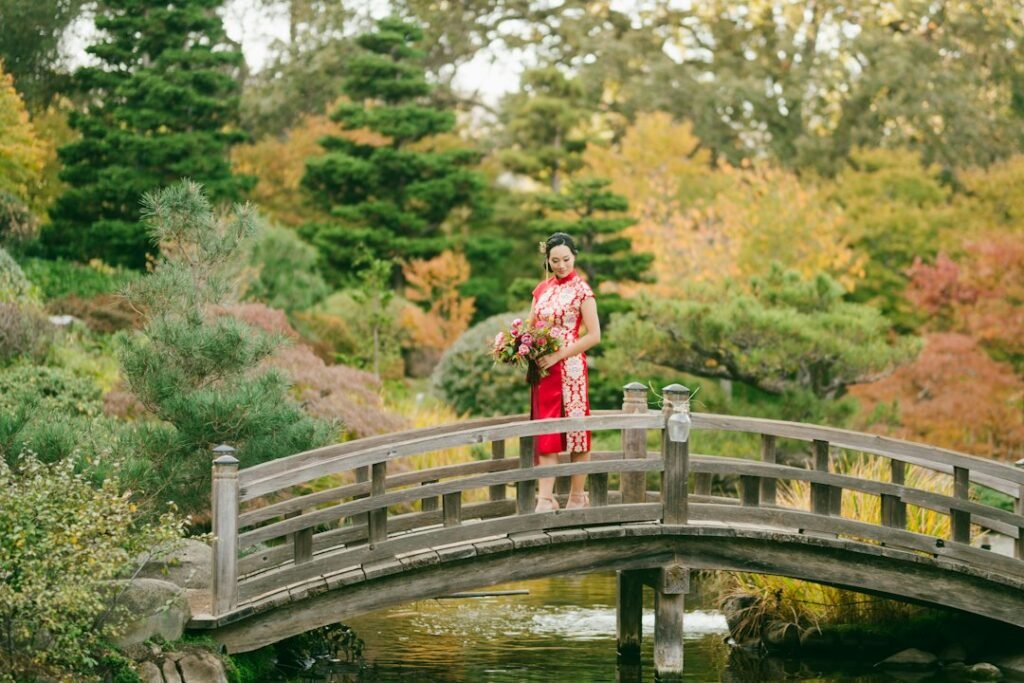Etiquette plays a crucial role in Chinese culture, as it is deeply rooted in the country’s long history and traditions. Chinese etiquette is a complex system of rules and customs that govern social interactions, business dealings, and everyday life. It is important to understand and respect these customs when interacting with Chinese people, as it can greatly impact relationships and perceptions. However, etiquette in China can differ significantly from Western culture, making it essential for foreigners to familiarize themselves with the customs and norms of Chinese society.
Table of Contents
ToggleKey Takeaways
- Etiquette is highly valued in Chinese culture and plays a significant role in social interactions.
- When addressing someone in China, it is important to use their formal title and show respect through proper greetings and introductions.
- Dining etiquette in China involves using chopsticks correctly, not wasting food, and showing appreciation for the host’s generosity.
- Gift giving in China is a way to show respect and build relationships, but it is important to avoid giving clocks or sharp objects.
- In a business setting, it is important to dress professionally, exchange business cards, and show respect for hierarchy and seniority.
Chinese Etiquette – Chinese Vocabulary and Sentences
Chinese etiquette is a broad topic that encompasses a range of social norms, cultural practices, and manners that are considered polite and appropriate in Chinese society. Here are some Chinese vocabulary words and sentences related to this topic:
- 礼貌 (lǐ mào) – Politeness
- 中国人非常重视礼貌。
- Zhōngguó rén fēicháng zhòngshì lǐmào.
- Chinese people place great importance on politeness.
- 尊重 (zūnzhòng) – Respect
- 在中国,尊重长辈是非常重要的。
- Zài Zhōngguó, zūnzhòng zhǎngbèi shì fēicháng zhòngyào de.
- In China, respecting elders is very important.
- 面子 (miànzi) – Face (social standing, respect)
- 给别人留面子是中华文化的一部分。
- Gěi biérén liú miànzi shì Zhōnghuá wénhuà de yī bùfen.
- Giving others “face” is a part of Chinese culture.
- 客气 (kèqi) – Courteous
- 在中国,客气是良好教养的表现。
- Zài Zhōngguó, kèqi shì liánghǎo jiàoyǎng de biǎoxiàn.
- In China, being courteous is a sign of good upbringing.
- 握手 (wò shǒu) – Handshake
- 当你见到新朋友时,可以握手表示友好。
- Dāng nǐ jiàn dào xīn péngyǒu shí, kěyǐ wò shǒu biǎoshì yǒuhǎo.
- When you meet new friends, you can shake hands to show friendliness.
- 谢谢 (xièxiè) – Thank you
- 记得对每次帮助你的人说谢谢。
- Jìdé duì měi cì bāngzhù nǐ de rén shuō xièxiè.
- Remember to say thank you to everyone who helps you.
- 不客气 (bù kèqi) – You’re welcome
- 当有人感谢你时,你可以说“不客气”。
- Dāng yǒurén gǎnxiè nǐ shí, nǐ kěyǐ shuō “bù kèqi”.
- When someone thanks you, you can say “You’re welcome”.
- 道歉 (dàoqiàn) – To apologize
- 如果你犯了错,应该及时道歉。
- Rúguǒ nǐ fànle cuò, yīnggāi jíshí dàoqiàn.
- If you make a mistake, you should apologize in time.
- 介绍 (jièshào) – Introduction
- 在社交场合,恰当的自我介绍是必要的。
- Zài shèjiāo chǎnghé, qiàdàng de zìwǒ jièshào shì bìyào de.
- In social situations, a proper self-introduction is necessary.
Understanding and using these terms can help you navigate various social settings in China with greater cultural sensitivity and respect.
Greetings and Introductions
In Chinese culture, addressing someone properly is of utmost importance. It is customary to address someone by their title or surname followed by their given name. However, the form of address can vary depending on the person’s age and status. For example, it is common to address older individuals with respect by using their title or honorific, such as “Lao” for an older person or “Xiansheng” for a man. When meeting someone for the first time, it is polite to offer a handshake, but be aware that physical contact may not be as common as in Western cultures.
Making a good first impression is crucial in Chinese culture. It is important to be punctual for meetings and appointments, as lateness is considered disrespectful. When greeting someone, it is customary to offer a slight bow or nod of the head as a sign of respect. Maintaining eye contact during conversations is also seen as a sign of attentiveness and respect. Additionally, it is important to avoid using overly familiar language or gestures when meeting someone for the first time.
Dining Etiquette
Dining etiquette holds great significance in Chinese culture, as meals are often seen as an opportunity for socializing and building relationships. When using chopsticks, it is important to use them correctly and avoid any improper handling or gestures. It is considered impolite to point with chopsticks, play with them, or leave them sticking upright in a bowl of rice. Instead, they should be placed on the chopstick rest or on the side of the plate when not in use.
There are also certain taboos to avoid at the dinner table. For example, it is considered impolite to finish all the food on your plate, as it may imply that the host did not provide enough food. Leaving a small amount of food is seen as a sign of appreciation. It is also important to show respect to the host by waiting for them to start eating before you begin. Additionally, it is customary to offer a toast or cheers before drinking alcohol during a meal.
Gift Giving in China
Gift giving is an important aspect of Chinese culture and plays a significant role in building and maintaining relationships. When giving gifts in China, it is important to choose appropriate items that reflect thoughtfulness and respect. Common gifts include tea, fruit, and high-quality alcohol. It is best to avoid giving clocks or anything white, as they are associated with death and funerals in Chinese culture.
The timing of gift giving is also important. It is customary to bring a gift when visiting someone’s home or when attending a special occasion such as a wedding or birthday celebration. When presenting a gift, it is important to do so with both hands as a sign of respect. The gift should be wrapped neatly and beautifully, as presentation is highly valued in Chinese culture.
Business Etiquette
Building relationships is crucial in Chinese business culture, as trust and personal connections play a significant role in business dealings. It is important to take the time to get to know your Chinese counterparts and establish a personal connection before discussing business matters. This can be done through socializing and sharing meals together.
When exchanging business cards, it is important to do so with both hands and offer it with the Chinese side facing up. It is customary to receive a business card with both hands and take a moment to read it before putting it away. It is also important to show respect to the most senior person in the room and address them first during meetings or negotiations.
Social Etiquette

Proper behavior in public places is highly valued in Chinese culture. It is important to be mindful of your actions and avoid any behavior that may be considered rude or disrespectful. For example, it is impolite to speak loudly or make excessive noise in public places. It is also important to show respect to elders by offering them your seat on public transportation or allowing them to enter a room first.
There are also certain taboos to avoid in social situations. For example, it is considered impolite to point at someone with your finger, as it is seen as confrontational. Instead, it is better to use an open hand or gesture with your whole hand. Additionally, it is important to avoid discussing sensitive topics such as politics or religion, as these can be divisive and may lead to uncomfortable situations.
Communication Etiquette
Communication in Chinese culture often relies on indirectness and subtlety. It is important to pay attention to non-verbal cues and read between the lines when communicating with Chinese people. Direct confrontation or disagreement may be seen as impolite or confrontational, so it is important to express opinions or concerns in a tactful and respectful manner.
When communicating with Chinese people, it is important to be patient and allow for pauses or silence during conversations. This allows for time to process information and consider responses. It is also important to avoid interrupting others while they are speaking, as this can be seen as disrespectful.
Dress Code and Appearance
Appropriate attire can vary depending on the situation in Chinese culture. In formal settings such as business meetings or formal events, it is best to dress conservatively and professionally. Men should wear suits or dress shirts with ties, while women should opt for modest and professional attire.
There are also certain taboos to avoid in dress and appearance. For example, it is best to avoid wearing revealing or provocative clothing, as modesty is highly valued in Chinese culture. It is also important to avoid wearing all black or all white, as these colors are associated with mourning and funerals.
Taboos and Superstitions
Chinese culture is rich in taboos and superstitions, and it is important to be aware of these customs to avoid causing offense or disrespect. For example, it is considered bad luck to give someone a clock as a gift, as the pronunciation of the word for “clock” in Chinese sounds similar to the word for “death.” It is also important to avoid giving sharp objects such as knives or scissors as gifts, as they are associated with cutting ties or relationships.
Understanding cultural beliefs is crucial in Chinese culture. For example, the number four is considered unlucky because it sounds similar to the word for “death” in Chinese. Similarly, the number eight is considered lucky because it sounds similar to the word for “wealth” or “prosperity.” It is important to be mindful of these beliefs and respect them when interacting with Chinese people.
Travel Etiquette
When traveling in China, it is important to respect local customs and traditions. This includes being mindful of cultural differences and adapting your behavior accordingly. For example, it is important to dress modestly when visiting temples or religious sites. It is also important to be mindful of personal space and avoid touching or hugging strangers, as physical contact may not be as common as in Western cultures.
Being a respectful tourist also means being mindful of the environment and local communities. It is important to follow local regulations and guidelines, such as not littering or damaging natural or cultural heritage sites. It is also important to be respectful of local customs and traditions, such as not taking photographs without permission or participating in any activities that may be considered disrespectful or offensive.
Etiquette plays a significant role in Chinese culture, and understanding and respecting these customs is essential when interacting with Chinese people. From greetings and introductions to dining etiquette, gift giving, business etiquette, social etiquette, communication etiquette, dress code and appearance, taboos and superstitions, and travel etiquette, there are numerous aspects to consider when navigating cultural differences.
By familiarizing yourself with Chinese etiquette and customs, you can show respect and understanding towards the culture and build stronger relationships with Chinese people. It is important to approach these differences with an open mind and a willingness to learn and adapt. By doing so, you can navigate cultural differences with respect and understanding.








